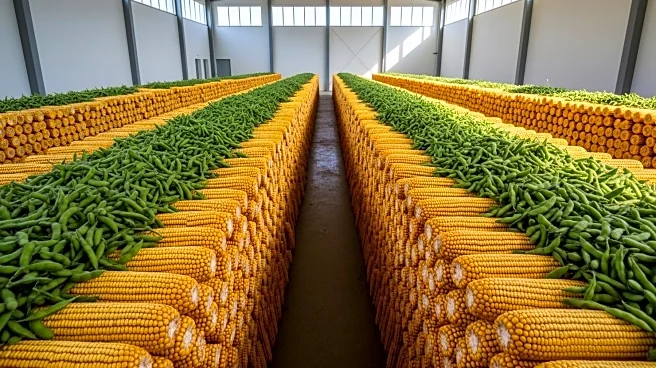What's Happening?
A recent study has evaluated the net returns of storing U.S. corn and soybeans since 1973, revealing that cash storage after June is generally not profitable due to declining prices. The study found that net returns to cash and futures hedged storage ending no later than June do not differ statistically from zero, indicating that returns merely cover total storage costs. Despite this, on-farm storage remains beneficial as it offers opportunities to improve farm profits through faster harvest and flexible post-harvest marketing. The study also noted that while not statistically significant, cash storage returns have been higher for soybeans than corn, consistent with faster consumption growth for soybeans.
Why It's Important?
The findings highlight the challenges faced by U.S. farmers in maximizing profits from corn and soybean storage. With cash storage after June proving generally unprofitable, farmers may need to reconsider their storage strategies to optimize returns. The study underscores the importance of on-farm storage, which can enhance profitability through operational efficiencies and marketing flexibility. Additionally, the higher returns for soybeans suggest a potential shift in focus for farmers, given the growing demand for soybeans. These insights are crucial for agricultural stakeholders as they navigate market dynamics and seek to improve economic outcomes.
What's Next?
The study suggests that farmers might benefit from investing in on-farm storage facilities to capitalize on operational efficiencies and marketing flexibility. As the demand for soybeans continues to grow, farmers may also consider adjusting their crop focus to leverage higher returns. Future research may explore the impact of South America's production growth on U.S. storage returns, potentially influencing strategic decisions in the agricultural sector. Stakeholders will likely monitor these trends closely to adapt their practices and maximize profitability.
Beyond the Headlines
The study's findings may prompt discussions on the broader implications of agricultural storage practices, including environmental and economic impacts. As farmers seek to optimize storage strategies, considerations around sustainability and resource management may become increasingly relevant. Additionally, the study's insights could influence policy discussions on agricultural support and investment in infrastructure to enhance farm profitability.











